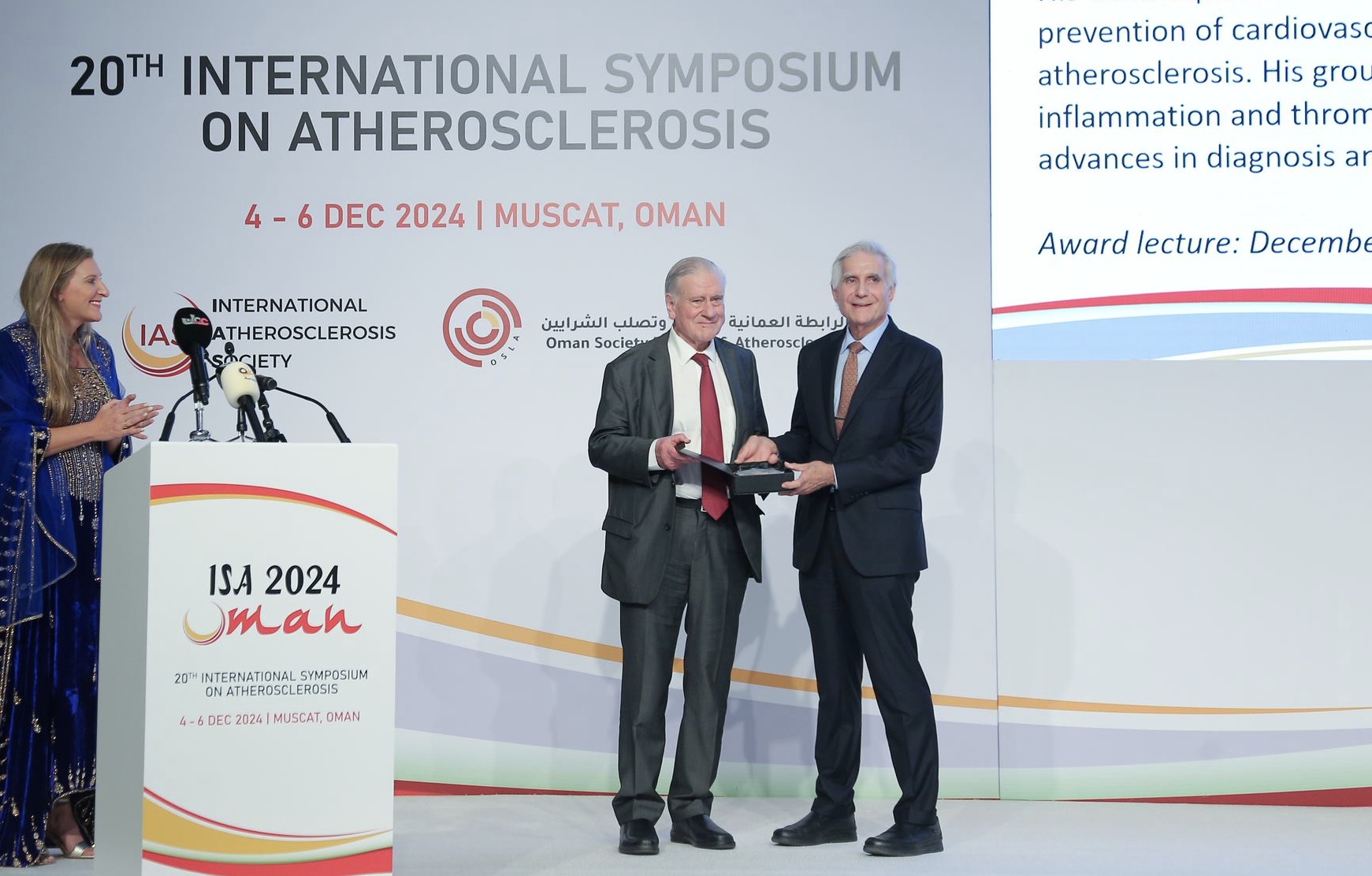Valentin Fuster, wins prestigious award from the International Atherosclerosis Society
The International Atherosclerosis Society recognizes the contributions to the understanding and treatment of atherosclerosis by the director of the National Center for Cardiovascular Research (CNIC) and president of the Mount Sinai Fuster Heart
The International Atherosclerosis Society has awarded Dr. Valentín Fuster, Director of the National Center for Cardiovascular Research (CNIC), President of theMount Sinai Fuster Heart Hospital, and Chief Physician of Mount Sinai Hospital, the Antonio M. Gotto Jr. Prize in Atherosclerosis Research in recognition of his outstanding contributions to the understanding and treatment of atherosclerosis. The award was presented by Peter Libby, President of the International Atherosclerosis Society, during the opening ceremony of the International Atherosclerosis Society's Annual Symposium in Oman.
This award honors Dr. Fuster’s outstanding contributions to the understanding of the progression, prevention, and treatment of atherosclerosis, also known as hardening of the arteries.
“I am proud for the recognition and especially for my colleagues who collaborated with me in the research enterprise,” says Dr. Fuster.
Dr. Fuster’s work over the last 40 years has broadly focused on atherosclerosis and has made a strong impact on global health. His research involves landmark mechanistic studies, treatment and diagnostic breakthroughs, and addressing the global public health crisis of non-communicable diseases through novel lower-cost preventive methods and treatment strategies. Dr. Fuster’s vast achievements have changed how clinicians practice medicine worldwide.
His groundbreaking research on the role of inflammation and thrombosis in atherosclerosis led to major advances in diagnosis and therapy. Among his many discoveries, Dr. Fuster identified that platelets play a role in coronary thrombosis and blockages. He was the first investigator to use aspirin in heart disease, specifically to prevent occlusion after bypass grafting. Dr. Fuster’s research also identified that cell cycle inhibitors reduce coronary in-stent restenosis, when a previously blocked coronary artery narrows after being treated with a stent. His research using high-resolution, non-invasive imaging monitored the biological effects of statins on atherosclerotic plaque and found that specific medication was associated with a significant regression in atherosclerotic lesions.
Drs. Vicente Andrés and Borja Ibáñez, Director of Basic Research and Scientific Director of CNIC, respectively, were the ones who nominated Dr. Fuster for this IAS award. "Dr. Fuster is an internationally recognized biomedical researcher and scientific leader in the field of cardiovascular diseases. His work has provided and continues to provide exceptional scientific, medical, and educational advances that are paving the way for a better understanding of the causes of cardiovascular diseases and contributing to reducing their burden on the healthcare system and the economy," they stated.
Polypill
Dr. Fuster helped develop a cardiovascular “polypill”—a single pill that includes three medications typically taken separately—that is effective in preventing secondary adverse cardiovascular events in people who have previously had a heart attack. Dr. Fuster and his team showed that the polypill reduces cardiovascular mortality by 33 percent in this population. This medication was recently included by the World Health Organization in its List of Essential Medicines and is pending Food and Drug Administration approval in the United States. Additionally, Dr. Fuster’s work has been central to improving the health of patients with cardiovascular disease. He has designed, developed, and implemented early health education problems globally that have had positive impacts on society and promoted healthy habits in underserved communities at higher risk of heart disease.
Dr. Fuster was named Director of the Cardiovascular Institute at Mount Sinai in 1994, became Director of Mount Sinai Heart at its establishment in 2006, and held that position until the end of 2022. He built what is now known as Mount Sinai Fuster Heart Hospital into one of the world’s leading centers for cardiovascular care, cardiac surgery, and advanced research. Dr. Fuster is also General Director of the Spanish National Center for Cardiovascular Research (CNIC).
His research into the origin of cardiovascular events, which has contributed to improved treatment of heart attack patients, was recognized in 1996 by the Prince of Asturias Award for Technical and Scientific Research, the highest international award given by Dr. Fuster’s native Spain. In June 2011 he was awarded the Grand Prix Scientifique of the Institute of France for his translational research into atherothrombotic disease. Recently, he was named a Prince Mahidol Award Laureate in Thailand for his lifelong contribution to the field of medicine, and in 2022, the American College of Cardiology instituted the “Valentin Fuster Award in Science and Innovation,” which will be given to a single physician annually for the next 13 years. He also recently received the Lifetime Achievement Award from the World Heart Federation.
Dr. Fuster has also received the highest awards for research from the four leading cardiovascular organizations: the American Heart Association, American College of Cardiology, European Society of Cardiology and the Interamerican Society of Cardiology.











